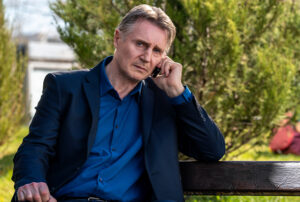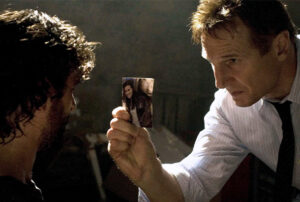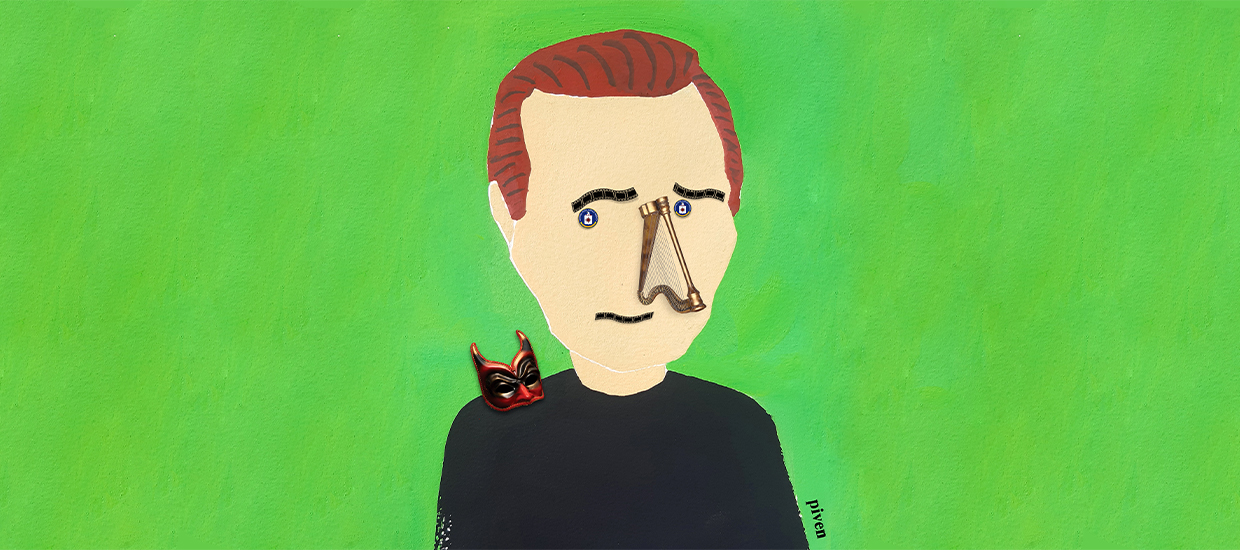In a new thriller, the thinking man’s action hero tackles a truly scary enemy: his own Memory
Liam Neeson is the rare Hollywood star who’s as easy to picture taking someone’s confession as slamming their skull down onto a bar. The soulful, sensitive bonecrusher of a dozen-odd action films, the Northern Irishman began carving out his curious niche after decades of acclaim in serious roles. When he signed on to play former Green Beret and CIA operative Bryan Mills in the 2008 action thriller Taken, Neeson already had two Tony nominations and an Oscar nod to his credit, something you wouldn’t find in bios for Steven Seagal or Jean-Claude Van Damme. “I’m loathe to call it a style,” Neeson says of the ruthlessly pragmatic hand-to-hand-combat technique he learned from British Special Air Service advisors for that breakthrough role. “We just try to make it real. When I did the first Taken, I’d just turned 55, so I didn’t want to pretend I was 30. I want to fight my age.”
Now 70, Neeson has found a poignant new way to fight his age. In the new thriller Memory, he plays a hit man grappling with early-stage Alzheimer’s. While that set-up reads a bit like a pitch for a dark comedy, Memory is, much like its Belgian source material, De Zaak Alzheimer, deadly serious. Martin Campbell, director of the Bond film Casino Royale, briskly moves Neeson, Guy Pearce, and the rest of a strong cast through the beats of a tense cat-and-mouse game set in a world of drug cartels and child prostitution. Against this grim backdrop, Neeson’s Alex Lewis goes through the familiar moves of an elite undercover assassin, his every step freighted with the tension of a potential mental lapse. (Will he forget the body stashed in his trunk?)
Calling from his home in upstate New York, where he says “my little daffodils are finally starting to show their heads,” Neeson speaks in a soft coo that occasionally breaks into a raspy laugh. Sound of body and mind, he speaks as one who’s learned the value of endurance.

Memory is an inspiration: taking one of your brutally capable characters and adding such an affecting and common weakness.
Oh, thanks. I hope so. They sent me the Belgian version and I was really, really taken with the story, and I loved the actor who played the main role. I read the new script and thought back to that film, which I really enjoyed, and I thought if it had one fault, it was that the director was doing pyrotechnics with the camera to show you inside Alex’s mind. I felt we did not need that.
So you did it the old-fashioned way, showing that frailty and fear yourself?
Right. When I spoke to Martin Campbell, the director, he absolutely agreed, and I was able, for once among all these action characters I’ve been playing, to do a lot of research. I began watching documentaries on Alzheimer’s and dementia, and I have a couple of people I know from back home in Ireland going through it at the moment. Just reading stuff about it was horrible, and yet it was also incredibly fascinating—certainly appealed to the actor in me.
Was it tough to balance outward signs of the illness with the required heroics of action films?
Well, I told Martin, who knew what I was trying to do, “Look, if I’m ever too much, let me know. Because I’ve seen all these documentaries and done all this research, so if it’s ever too much—maybe, say, slight stutters here and there—please tell me, and I’ll tone it back.” Sometimes when you do a lot of research, you want to show the research. It’s a mistake actors make—letting it get in the way of the story. I was very pleased with Martin’s cut. And I thought I was my usual… adequate self.
In Martin Scorsese’s 2016 film Silence, you play a stoic missionary to Japan whose faith brings immense punishments upon himself and his acolytes. There’s an interesting subset to your characters of the renegade priest, sensei, or apostate: Qui-Gon Jinn in Star Wars, Ra’s al Ghul in Batman Begins—not to mention the half-dozen Catholic priests you’ve played over the years. Does growing up Catholic in ’60s Northern Ireland sort of set you down a certain road as an actor?
Well, I was an altar boy and there was a period, around 12, 13, when I did think about becoming a priest. I guess I’d say I’m a lapsed Catholic, but also I’m reading a book by Roger Carswell called Before You Say “I Don’t Believe”; it’s about how it’s become fashionable to think Christians are naive and that science has debunked the need for God today. But my character in Silence, Cristóvão Ferreira, who actually existed, was a highly intelligent man. He was interested in astronomy, biology. And my thinking was, OK, he’s also a Jesuit, and Jesuits go through—it used to be 17 years of training before they were fully fledged. So my character studied science and mathematics to use the God-given gifts he had.
Did you come to acting with a similar sense of mission to what you got from the Church?
I loved the whole ceremony of the mass and what it was. I think I was falling in love with the drama of it—the costumes, the words, the event of the consecration, where this piece of bread symbolically becomes the body and blood of Jesus Christ. I remember as a kid ringing the bells when the priest holds up [the bread]. That always called to me, the transubstantiation.
Don’t theater people consider performance a sacred rite, with an audience, together in that theater this one time?
Yes, and I think that’s Catholicism in a nutshell.

You grew up in a violent time and place—how did the Northern Ireland of your youth shape who you are now?
Look, I was born in 1952, I was a teenager during the civil rights movement, brought up working-class Catholic in a place where Catholics were treated as second-class citizens, and that led to the civil rights marches in Derry, that led to people being murdered by the British forces, that led to the formation of the IRA. I grew up surrounded by violence. I was certainly aware of the injustices, but what saved me from joining any organization was being involved in amateur boxing and doing school plays. I was an amateur boxer from the age of 9 to 17, and we’d travel to Belfast from my town, about 30 miles away. I boxed with kids who’d go on to die in the Troubles. Horribly. I can’t stress enough what it was to be constantly surrounded by violence, and I couldn’t wait to get the f*** out of there. Boxing and theater saved my life, actually. I’m sure of it.
At one point in Memory, Guy Pearce’s character is describing how an eyewitness fails to identify the murderer in a line-up, and he says, “Memory is a mother******.” I kind of love that line, how it resonates in different ways.
Oh, it’s a lovely speech he makes, I know what you mean. Guy, I’ve always admired him, back to L.A. Confidential. He’s from Melbourne, and we’ve become new pals, so I was really thrilled to work with him. He really roots the story in reality, and a very believable one. I think he’s terrific in the film.
And he’s also played someone with memory problems—the amnesiac in Memento.
Oh, Chris Nolan’s film! Absolutely. That was terrific. I’d forgot all about Memento!
You and Pearce both often play American characters. I know some Australian actors, like Ben Mendelssohn, are particularly masterful at accents. Was that ever something you worried about?
It’s interesting you bring that up, because I’ve often thought about that. When I made the move out to LA to try and live there, Gabriel Byrne was an old pal I’d inevitably run into, because we were auditioning for the same part. I remember one hot, hot day in LA, showing up at some studio dressed all in black for Francis Ford Coppola’s Dracula, and there’s Gabriel walking around dressed all in black. [Chuckles.] I’d ask Gabriel about accents—he’s from Dublin, I’m from a little town outside Belfast: “How do you handle it?” Because this is back in the ’80s, meeting casting directors who’d hear me talking and say, ‘I’m sorry, L-L-Lyle is it? Lyle… Nelson?’ And I’d say, ‘Yeah, that’s close enough.’ Gabriel said that he’d try to go in with an American accent and do the audition that way. I tried that a couple of times, and I felt, I’m just being false. Just be yourself and if it comes up, which it inevitably did, they might say, “Can you do an American accent?” And I’d always say, “Yes, I need to work on it, and I want to work on it, but yes.” And, look, yes, in a performance where I’m supposed to be American I can hear little twangs of being Irish now and again, but it doesn’t bug me, you know what I mean? We’re all mongrels.
But Irish mongrels seem to have a more existential twang to their souls. I read that you considered getting a Samuel Beckett quote tattooed on your body. What was it?
“Ever tried. Ever failed. No matter. Try again. Fail again. Fail better.”
Well, that’s hard to top.
Oh, I have to read something somebody sent me the other day. Hold on… [He disappears for 30 seconds.] OK, this passage could also describe my character Alex [in Memory.] It’s attributed to William Butler Yeats, the Irish poet, and I quote: “Being Irish, he had an abiding sense of tragedy, which sustained him through temporary periods of joy.” [Laughs]
Good luck getting a rom-com role with that kind of talk. Is there any type of genre you’d still like to take on?
I love writers, man, and for me it’s always the script. I have to say I’m not a superhero fan, as much as I admire the Hollywood technology and expertise they bring to it, which is just dazzling. I’m not a fan of that genre. I’ve just finished playing Philip Marlowe in a Neil Jordan film just before Christmas, which is actually my 100th film—I can’t f****** believe it.
Yeah, you’re a giant action hero now, even though you didn’t begin this phase of your career until you were 55. That’s my age now, so my action-film career might be just around the corner!
[Laughs.] You’re a kid!
Both your career and physical presence seem to testify to the idea of true endurance, to staying in the kind of shape that matters. If someone had to do only one exercise, what would it be?
I’m not a gym rat, Chris. Used to be, a number of years ago, again, doing boxing training, but I work out on my own, I do something every day. If it goes beyond 30 minutes, I’ve done too much. But if I was to do something—this is true of the whole populace, for all of us—it’s a brisk walk for 30 minutes, 40 minutes. What you guys call a power walk, maybe? I call it a brisk walk. Do that every day, you’ll be fit for life.
Next Up: ‘Succession’ Actor Brian Cox on the “Gift” of Being Typecast as a Horrible, Horrible Man
